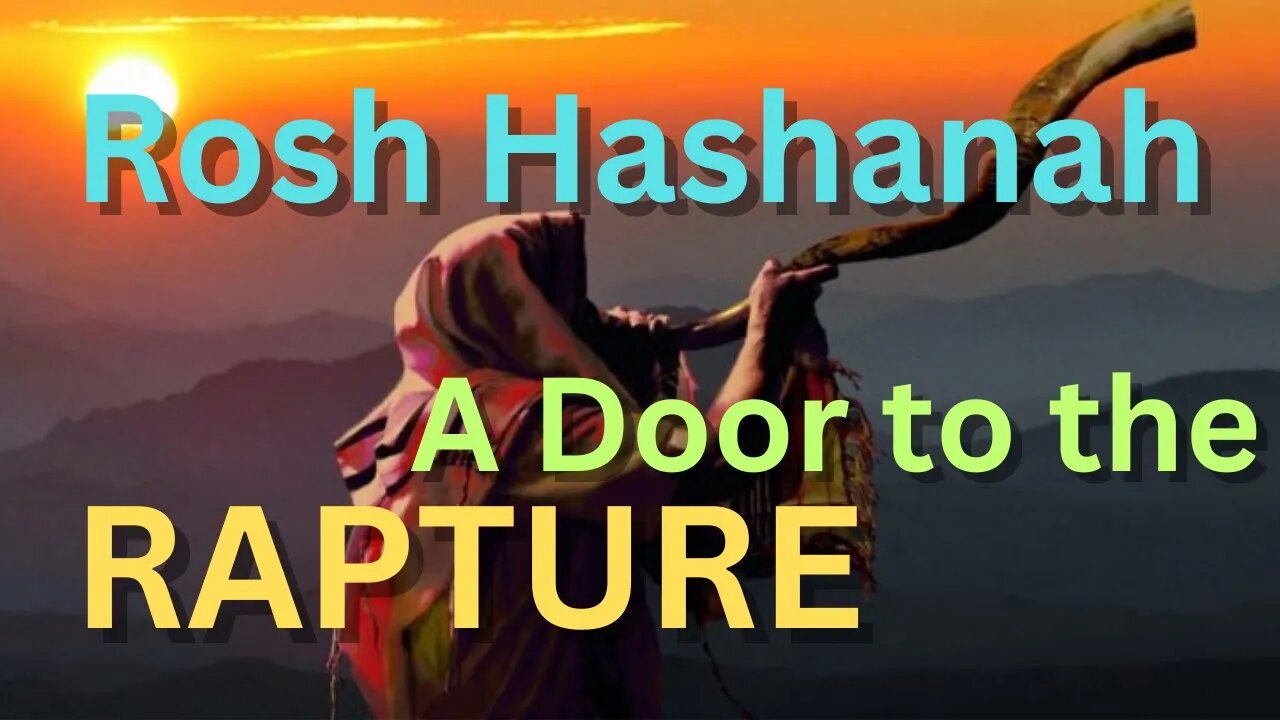Premium Only Content

Rosh Hashanah, Prophetic Sign and Sacred Significance, and Its Role as a door to Rapture
The precise occurrence of the Rapture, a significant event in prophetic literature, is veiled in obscurity.
According to the words of Jesus, as recorded in the Gospel of Matthew (24:36), the precise day and hour of this event remain unknown, even the celestial beings in heaven and even the Son, with only the Father possessing such knowledge.
The presence of ambiguity has prompted several academics to undertake an investigation into the complex elements of scripture to uncover potential indications or insights.
One idea of particular interest revolves on Rosh haShanah, a significant Jewish holiday known as the Feast of Trumpets,
The holiday signifies the start of the Jewish secular year, which begins with the observation of the appearance of the new moon.
During ancient times, the emergence of the new moon was traditionally announced by the observation of two individuals gazing into the celestial realm, reminiscent of the anticipated entrance of the two witnesses as promised in the Book of Revelation.
The witnesses would declare the formal commencement of Rosh haShanah, a celebration that extends over a duration of two consecutive days, namely Tishri 1 and 2.
As a result, the expression "we do not possess knowledge of the specific day or hour" has been closely associated with Rosh haShanah, resonating with the cryptic utterances of Jesus.
During the observance of Rosh haShanah, the atmosphere resonates with the auditory presence of trumpets, namely the shofars.
As per the aforementioned notion, it is postulated that an orchestration of heavenly trumpets would precede the manifestation of Jesus in the atmospheric expanse.
The culmination of this celestial event, characterised by the sounding of the last trumpet (1 Corinthians 15:52 and 1 Thessalonians 4:16), will serve as an indication of the precise instant when Jesus descends, accompanied by a gathering of celestial beings who will assemble the chosen faithful to join the Lord (as described in Matthew 24:31).
Nevertheless, the specific timing of Rosh haShanah, as well as the exact day and hour of its occurrence,
continue to elude human understanding, being exclusively known to the divine being referred to as the Father.
In this context, the only authority responsible for determining which individuals among the faithful are elevated and which ones are left behind rests exclusively with God.
Because of this uncertainty, it is impossible for any conscious being to correctly predict the exact day or time of their catching away or being caught up to join the Lord in the air.
The concept of the Rapture is a perplexing conundrum that poses a barrier to human comprehension, serving as a poignant reminder to believers of the vast intricacies inherent in God's divine plan.
In the face of ambiguity, the bible continues to serve as a guiding principle, compelling adherents to maintain a state of watchfulness, readiness, and unwavering commitment.
While the prophetic tapestry continues to unfold, Christians are called to rely on the deep wisdom of God, who skillfully weaves together the many threads of human history to fulfil God's promises.
-
 1:58:10
1:58:10
Robert Gouveia
8 hours agoMatt Gaetz REJECTS Report, Sues Committee; Luigi Fan Club Arrives; Biden Commutes; Festivus Waste
73.3K76 -
 58:10
58:10
Kimberly Guilfoyle
9 hours agoAmerica is Back & The Future is Bright: A Year in Review | Ep. 183
59.9K50 -
 3:03:27
3:03:27
vivafrei
14 hours agoEp. 242: Barnes is BACK AGAIN! Trump, Fani, J6, RFK, Chip Roy, USS Liberty AND MORE! Viva & Barnes
108K80 -
 8:09:50
8:09:50
Dr Disrespect
12 hours ago🔴LIVE - DR DISRESPECT - MARVEL RIVALS - GOLD VANGUARD
186K30 -
 1:15:00
1:15:00
Awaken With JP
11 hours agoMerry Christmas NOT Happy Holidays! Special - LIES Ep 71
169K134 -
 1:42:21
1:42:21
The Quartering
13 hours agoTrump To INVADE Mexico, Take Back Panama Canal Too! NYC Human Torch & Matt Gaetz Report Drops!
133K99 -
 2:23:15
2:23:15
Nerdrotic
12 hours ago $12.27 earnedA Very Merry Christmas | FNT Square Up - Nerdrotic Nooner 453
103K11 -
 1:14:05
1:14:05
Tucker Carlson
12 hours ago“I’ll Win With or Without You,” Teamsters Union President Reveals Kamala Harris’s Famous Last Words
195K361 -
 1:58:31
1:58:31
The Dilley Show
12 hours ago $33.68 earnedTrump Conquering Western Hemisphere? w/Author Brenden Dilley 12/23/2024
149K40 -
 1:09:59
1:09:59
Geeks + Gamers
13 hours agoSonic 3 DESTROYS Mufasa And Disney, Naughty Dog Actress SLAMS Gamers Over Intergalactic
101K21